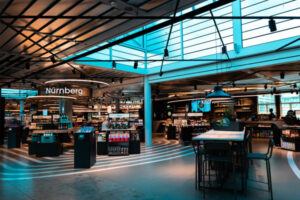By Kirill Stepanov
The last two years have been a game changer for the shopping center industry, as well as for many other industries in Russia. The factors influencing this process are well known: the pandemic and global digitalization.
Let me begin with the pandemic. For several months in 2020, malls across Russia were practically closed–only those tenants who sold so-called “essential goods” remained open. During that period, many companies were affected, especially small and mid-sized businesses. Such companies are not often able to profit from a financial “safety bag”, unlike major brands, which survived by means of cost reduction. According to our statistics, about 30% of stalls completely left the market. Eateries, entertainment, and children’s goods were the most affected sectors. During the downtime, despite malls providing various concessions to tenants, not everyone survived the lockdown. However, there were those that were less affected by the pandemic. Such brands managed to adapt–they began to function as pick-up points and partially compensated for flagging sales.
In Russia, measures to prevent coronavirus transmission are gradually being relaxed. However, shopping centers still feel the burden of its consequences. Throughout the country, some restrictions remain in place: Mass events are banned, maximum occupancy of cinemas is limited, and social distancing is a must. Some regions have cut malls business hours, others have imposed bans on certain types of tenants or have mandated vaccinations for a certain share (in some cases 100%) of the staff.
In that regard, shopping centers are still struggling to return to the pre-crisis levels of performance in terms of both footfall and turnover. Recovery largely depends on how quickly shopping malls and tenants can adapt their work to comply with the new requirements that have been set by the Russian authorities. In such a non-standard situation it is very difficult to forecast the operations management.
Moreover, Russians–especially those who live in urban areas–need to be convinced that shopping malls are safe places to frequent. Visitors used to evaluate malls by the variety of tenants or transport accessibility, but now, there is another important criterion–the observance of sanitary regulations.
The pandemic has intensified global digitalization, which is another challenge that the Russian mall industry is facing. During the lockdown periods, online stores and marketplaces benefitted from an additional boost to their development. Their logistics have been significantly improved. Hence, the online sales share has increased remarkably, at the expense of traditional retail. According to the research agency Data Insight, in 2020, online commerce in Russia grew by 58%. In non-food products, the share of online commerce is now estimated to be 21%. Russia boasts one of the world’s fastest growing e-commerce segment markets. Shopping malls have been forced to react to this trend, for example, by creating their own marketplaces.
The general lockdown that occurred last year, which lasted an average of about three months in Russia, was a force majeure event that nobody could have foreseen. Being pushed out of the comfort zone prompted both malls and tenants to be flexible and to make quick decisions. The experience we have gained has helped us improve and develop bold concepts that resonate with our guests.






